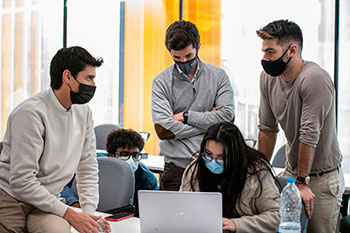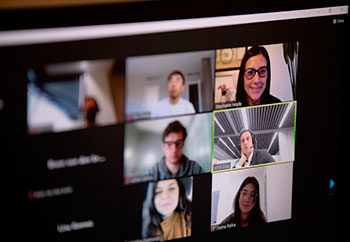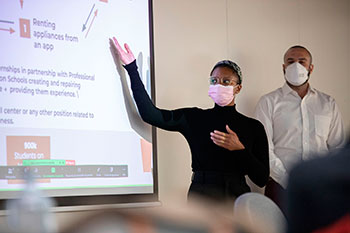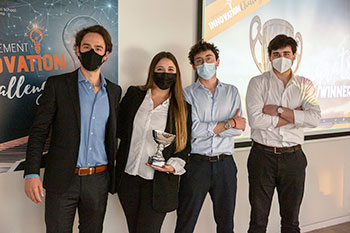MiM Disruptive Innovation Challenge 2022
 From February 14 to 16, EADA held the MiM Disruptive Innovation Challenge 2022. During the Challenge, International Master in Management participants had the chance to take part in a disruptive innovation bootcamp in class by putting into practice three principles of disruptive innovation: making the impossible possible, the exclusive inclusive, and inaccessible the accessible. The Challenge, which was co-led by EADA Dean Jordi Díaz and Professor James Haigh, was a 3-day competition where participants worked in teams to produce disruptive innovation business ideas.
From February 14 to 16, EADA held the MiM Disruptive Innovation Challenge 2022. During the Challenge, International Master in Management participants had the chance to take part in a disruptive innovation bootcamp in class by putting into practice three principles of disruptive innovation: making the impossible possible, the exclusive inclusive, and inaccessible the accessible. The Challenge, which was co-led by EADA Dean Jordi Díaz and Professor James Haigh, was a 3-day competition where participants worked in teams to produce disruptive innovation business ideas.
Inspired and supported by innovators
The first part of the challenge consisted of diving into the disruptive innovation framework. After an introduction by the two co-leaders of the initiative, participants heard inspiring stories from three successful entrepreneurs and business managers who have applied elements of the framework:
- EADA Alumna Anna-Sophia Kouparanis, who completed her International Master in Management at EADA in 2017. After graduation, she launched her own companies, becoming the first female founder and Managing Director of several medical cannabis start-ups in her home country of Germany. In 2020, she co-founded the medical cannabis holding company Bloomwell Group, the first German telemedicine company for medical cannabis. Anna-Sophia sees a clear objective for her businesses: “My goal is to ensure that more people are able to experience the benefits of telemedicine and cannabis.” The EADA alumna was recently featured on the Forbes 30 Under 30 for her entrepreneurial skills at Bloomwell Group. According to Anna-Sophia, all markets are open for disruption. “Focus on the one you know best” she says, “and try to come up with something that established companies are not even looking at.”
- Judit Giró is from Spain and is Co-Founder of the start-up The Blue Box. The Blue Box employs an AI-powered electronic nose for in-home breast cancer testing using urine samples with an accuracy of 95%. To Judit, her solution is “an alternative to mammograms, which are painful solutions because of radiation and false positives”. She went on to say that the mission of The Blue Box is to “decrease the number of women in the U.S. and Europe who are diagnosed with advanced breast cancer every year”. In her opinion, “disruption is becoming sexy, but it requires hard work, an agile mindset, tech skills and enough time to analyse a problem and test solutions”.
- EADA Alumna Stephanie Hoyle is from Peru and she undertook the International MBA in 2017. Today, she is the Venture CEO of Farmauna, an e-pharmacy from Auna, which is currently investing in the development of health tech in Peru. Her purpose is to democratise access to quality healthcare in South America. As Hoyle told our participants, “Healthcare in this region is one of the largest but most underserved markets and is a once-in-a-century tech disruption opportunity.” Since 2008, Farmauna has been applying constant innovations to make medical care and health solutions accessible to everyone. According to Stephanie, “Innovation and technology are the main tools to boost a business and generate social impact at scale.”
 In addition to hearing from three inspiring leaders in disruptive innovation, MiM participants had the support of EADA Alumni who acted as mentors and helped them in building and preparing their final pitches:
In addition to hearing from three inspiring leaders in disruptive innovation, MiM participants had the support of EADA Alumni who acted as mentors and helped them in building and preparing their final pitches:
- Mike Reiffers (Master in Management, 2014), Founder & Managing Partner at Skeeled, a complete Talent Acquisition software to attract and hire top talent.
- David Vives (Master in Management, 2014), Co-Founder & Executive Director at Tennders, a digital freight platform that simplifies the way shippers, carriers, and brokers connect. This platform contributes to reducing the number of lawyers in the process and creates a lean and transparent process.
- Ricard Tapias (Master in Management 2017), Co-Founder & CEO of DeWocracy. a technology to help companies manage hybrid work and reduce dependency on physical office space.
A real bootcamp

On the second day of the Disruptive Innovation Challenge, participants defined a problem and researched a solution. According to Dean Díaz, “the most important thing in the Challenge is not only what students develop --the solution to a real problem-- but falling in love with a problem”. To him, “there are plenty of problems, which means that there are plenty of business opportunities”.
According to Dean Díaz, there are many takeaways from this experience for participants: “Firstly, working in teams - some students aren’t from the same class, and for this activity they form a team together for 48 hours to develop a disruptive initiative. Secondly, they work under pressure with tight deadlines, so the Challenge takes them out of their comfort zone and provides growth. Thirdly, they have to make decisions very quickly about what works and what doesn’t base on testing and seeing the results.”
To James Haigh, the Innovation Challenge is a unique experience for a different reason: “First of all, we are talking about a ‘less academic’ experience within an academic context, so it connects with our ‘learning by doing’ methodology. It is about three intense days, like a real bootcamp, which is applied to an actual business reality. That is a kind of entrepreneurial spirit.”
Dean Diaz adds: “It is very important that the Disruptive Innovation Challenge takes place in the middle of participants’ master’s journey in February because they have already learned business concepts. This gives them the opportunity to look at the start-ups, to skill-up and to turn their ideas into a potentially real business.”
Final project presentations
 The winning project was You Matter, based on an accessible and low-cost solution to mental health and emotional support. The winning team was made up of Giulio Ferretti (Italy), Candelaria Nordahl (Argentina), David Rausell (Spain) and Vasco Pereira (Portugal). According to the team, “The goal was to provide affordable, easily accessible and approachable psychological support for young adults”. They were driven by a need that was unmet: “We realised that there were a lot of people who do not have access to this emotional support in cases of isolation, insomnia, academic stress or anxiety.” The competition offered the opportunity to explore the issue further, with the most challenging part being the strict deadlines: “Providing the best research analysis possible and coming up with the most fitting solution for this problem in such a short time was a challenge,” the team says.
The winning project was You Matter, based on an accessible and low-cost solution to mental health and emotional support. The winning team was made up of Giulio Ferretti (Italy), Candelaria Nordahl (Argentina), David Rausell (Spain) and Vasco Pereira (Portugal). According to the team, “The goal was to provide affordable, easily accessible and approachable psychological support for young adults”. They were driven by a need that was unmet: “We realised that there were a lot of people who do not have access to this emotional support in cases of isolation, insomnia, academic stress or anxiety.” The competition offered the opportunity to explore the issue further, with the most challenging part being the strict deadlines: “Providing the best research analysis possible and coming up with the most fitting solution for this problem in such a short time was a challenge,” the team says.
The runner-up position was held by RentME, dedicated to meeting the home appliance needs of those living abroad short-term in a convenient and affordable way while taking into consideration environmental and social elements. The third prize went to Share Wise, a platform creating a sharing community around food while reducing food waste by allowing users to share homemade meals in an affordable and convenient way.
